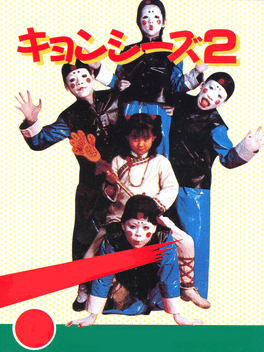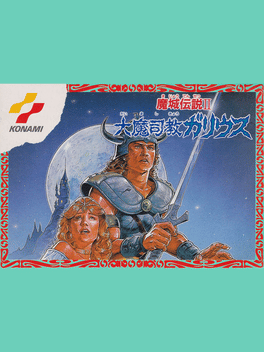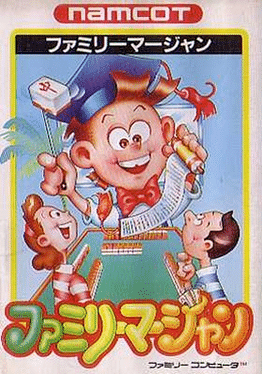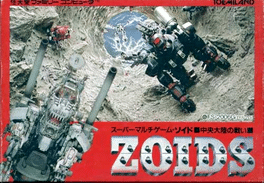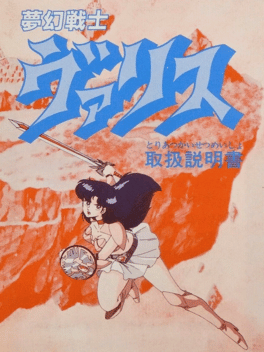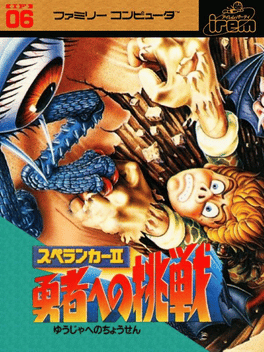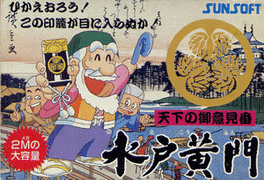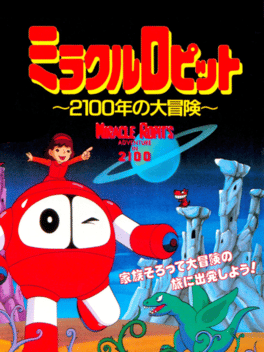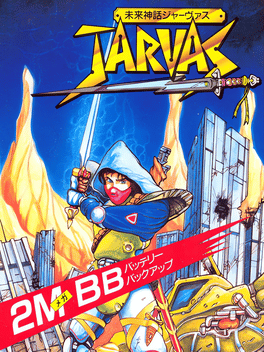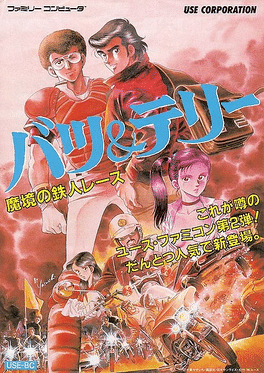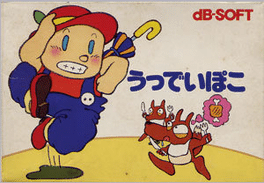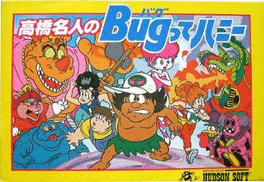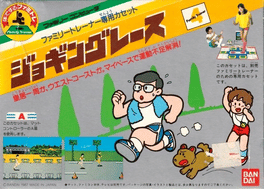New Family Computer Games - Page 41
-
Hikari no Senshi Photon: The Ultimate Game on Planet Earth
1987
Photon: The Ultimate Game on Planet Earth is an adventure game developed for the Famicom by Takara, and published in 1987. The English name of the game has special significance, since "Photon: The Ultimate Game on Planet Earth" is also the name of the first commercial version of a game commonly known today as Laser Tag. However, besides the name, and the fact that you play a character who fires a Photon gun, any further connection between the live action game and this video game is unknown. In the video game, you play a soldier who must navigate through several different floors of a dungeon which contains items and traps. The player must figure out how to maneuver through the dungeon in an effort to collect various items that will expand his ability to search, and find various disks which contain hints and messages to further aid the player. The game is played from a third-person behind-the-shoulder perspective and contains pseudo-3D visuals. This game was never released outside of Japan. -
Kyonshies 2
1987
Kyonshies 2
1987
A Famicom adventure game developed by Taito and based on an obscure Japanese movie of the same name. Kyonshiizu is the Japanese name for Jiang Shi, the Chinese hopping vampire. -
Majou Densetsu II: Daimashikyou Galious
1987
Majou Densetsu II: Daimashikyou Galious is a Role-Playing game, developed and published by Konami, which was released in Japan in 1987. -
Family Mahjong
1987
Family Mahjong
1987
A mahjong game by Nihon Bussan and published by Namco for the Famicom. Family Mahjong is another in a long line of mahjong games for the Famicom. Uniquely, at least for the time, it does include a full tutorial mode that will teach the player how to actually play mahjong. It also includes rules for mahjong gambling, which is another feature included in the game. After the player has learned how to play, they can compete against a series of CPU opponents in one-on-one matches, most of whom are attractive blonde women for whatever reason. -
Elnark no Zaihou
1987
Elnark no Zaihou
1987
Elnark no Zaihou is an adventure game developed and published by Towachiki. It presents the action from an overhead perspective, similar to many of the traditional 2D Zelda games. It is unusual in that it tracks the player's behavior and adjusts a meter which indicates whether the player is generally more good (Light) or more evil (Dark). Though a more evil player has stronger abilities, players must air on the side of good in order to make significant advances through the game. As a result, this game is considered extremely difficult, due to the unknown nature of how one should behave in order to proceed. If the player does not perform the correct actions, levels typically repeat themselves, and players find themselves stuck in the game with no clear method to advance. In fact, it was one believed that the only way to beat the game was to exploit a bug, however that has since been proven false. -
Zoids: Chuuou Tairiku no Tatakai
1987
Based on the popular Tomy/Hasbro toy license, Zoids: Chuuou Tairiku no Tatakai is an RPG/Shooter hybrid developed for the Famicom by the notorious Micronics. -
Family Trainer: Meiro Daisakusen
1987
A Famicom game developed by Bandai as part of their Family Trainer series, which all use the Family Trainer (Power Pad) accessory. The goal is to explore mazes. The fifth in Bandai's series of Family Trainer games, created for the accessory with the same name (or Power Pad in the US). Unlike the others, which tended to be athletics/exercise games, Meiro Daisakusen ("Epic Maze Battle") is a maze-exploring light RPG where the goal is to walk and jump around mazes to find items and, eventually, the exit. The game's controls are dictated entirely by the Family Trainer/Power Pad. Different buttons will either cause the protagonist to jump, walk forward, walk backwards, turn left or right or switch their position to the left, right or center of the screen. While searching for the exit, players must be mindful of the various enemies that also inhabit the mazes, most of which must be avoided by jumping over them or running past them. -
Mugen Senshi Valis: The Fantasm Soldier
1987
The Famicom port follows the same basic story, but instead of a series of separate stages, all of Vecanti is now one big, interconnected world. The gameplay differs considerably from the other versions, being more akin to a side-scrolling action role-playing game. It is a more difficult game due to its larger maze-style levels with multiple paths, and a lack of a password or save feature. -
Spelunker II: Yuusha he no Chousen
1987
Spelunker II: Yuusha he no Chousen is a Japan-exclusive action video game released for the Family Computer in 1987. An unofficial translation to English was made as a ROM hack. Despite being titled as a sequel to Spelunker, Spelunker II: Yūsha e no Chōsen features vastly different gameplay. There was a separate arcade sequel, titled Spelunker II: 23 no Kagi, which features similar gameplay to the first Spelunker game as well. The two Spelunker II games are separate entries in the series and are not related. -
Tenka no Goikenban: Mito Koumon
1987
This is an adventure game based on a TV show about a retired governor and his retainers going around solving problems in Edo period Japan. The game allowd players to assume the role of one of the retainers as they go around investigating the town. Occasionally this involves fights with corrupt officials, evil samurai and gangsters. There's also a female ghost that will drain the player character's life if it comes into contact with them. The game is noted for its many instances of speech samples. It also has a considerable amount of text. The game consists of seven stages. Players control Kaku-san (Kakunoshin), a jujutsu user, in the odd-numbered stages and Suke-san (Skesaburo), a katana user, in the even-numbered stages, and go around the action stages to collect evidence of evil deeds. The use of certain items allows the player to switch to a ninja or a servant for a certain period of time. The ninja can go undercover and the servant can interview the townspeople. In every stage, there is evidence that can only -
Miracle Ropit's Adventure in 2100
1987
Miracle Ropit's Adventure in 2100 is an action platformer featuring the titular robot, piloted by a young girl. When the robot is hit, it will break down and dump the girl out. The girl cannot shoot enemies, and will die after 30 seconds if she cannot restore the robot, which requires special items. The game often requires shooting at or jumping on certain unmarked spots repeatedly, either to uncover secrets or even to make progress in a stage at all. In order to reach the true ending, two loops of the game must be beaten. -
Family Trainer: Meiro Daisakusen
1987
A Famicom game developed by Bandai as part of their Family Trainer series, which all use the Family Trainer (Power Pad) accessory. The goal is to explore mazes. -
Mirai Shinwa Jarvas
1987
Mirai Shinwa Jarvas
1987
Mirai Shinwa Jarvas is a RPG developed and published by Taito. It is about a man named Jarvas who travels back in time from the future to conquer the world of the past and become the leader. You must get people to join your side and take over enemy castles. This game is generally considered pretty bad by most. When you begin the game, you are given no information about where you are and where you should attempt to go. Once you find a town, you must join a guild. You can only increase your level by returning to the guild once you have accumulated enough experience. -
Hokkaido Rensa Satsujin: Okhotsk ni Kiyu
1987
A man's corpse is discovered near a sea wharf in Tokyo Bay. While the police investigates, a 2nd and 3rd murder occurs one after another. You begin your investigating with Shunsuke Saruwatari, a detective from the Kushiro station, and seek the truth to discover the criminal's motivation. An examination of the relation between the victims exposes a important details from the past. -
Bats & Terry
1987
Bats & Terry
1987
The player controls a baseball superhero named Batsu (Bats) who must use baseballs to defeat his opponents. Being hit once reverts him to "normal" Terii (Terry), who swats at his opponents using a baseball bat. Opponents include machinery, humanoids, and animals. Killing opponents while in Terii form results in a larger energy bar. -
Fantasy Zone
1987
-
Woody Poko
1987
Woody Poko
1987
The player controls an old wooden figure named "This Baggage." He is a hero who has lived in harmony with humans for many years. For This Baggage, the journey is to find the fairy who teaches people to get back to being friendly with wooden dolls. Enemies encountered through the game are strange creatures and bothersome old men. The player attacks by using his fists at them. Players can steal the items in the store. But after stealing, the player's appearance is changed to resemble that of a thief. Hotels and pawn shops can no longer admit the player for the remainder of the game after a theft has taken place. -
Booby Kids
1987
Booby Kids
1987
During the prehistoric era of humanity, cavemen and dinosaurs compete for ultimate supremacy. A young boy has to collect important treasure without being killed by the rampaging dinosaurs. All he can do is attempt to temporarily paralyze them with a specialized dinosaur trap. All treasures must be collected before admittance to the next level is possible. One hit from either a dinosaur, caveman, or other type of enemy instantly kills the player. -
Takahashi Meijin no Bug-tte Honey
1987
An adventure platformer game starring Master Takahashi of Adventure Island fame. It is based on an anime which in turn was based on the Adventure Island games.. -
Family Trainer: Jogging Race
1987
An exercise game created for the Family Trainer (the Japanese name for the NES Power Pad) developed by Human and published by Bandai. Jogging Race is the fourth game created by Bandai for the Family Trainer (US: Power Pad) accessory for Famicom systems. It was one of the many games that used the peripheral that did not see a release outside of Japan. As with other Family Trainer games, the emphasis was on receiving a work out using the Famicom, a conceit that would later find greater success with the Nintendo Wii and the Wii Fit games. Specifically, Jogging Race is about jogging through areas of a simulated Tokyo using the pad to simulate the exercise. The background scrolls by slowly, accurately matching the scale of the distances found in the real location, and will occasionally include additional details like other joggers. There is also a second mode named Marathon, in which the player competes in a long distance race with other CPU runners.

